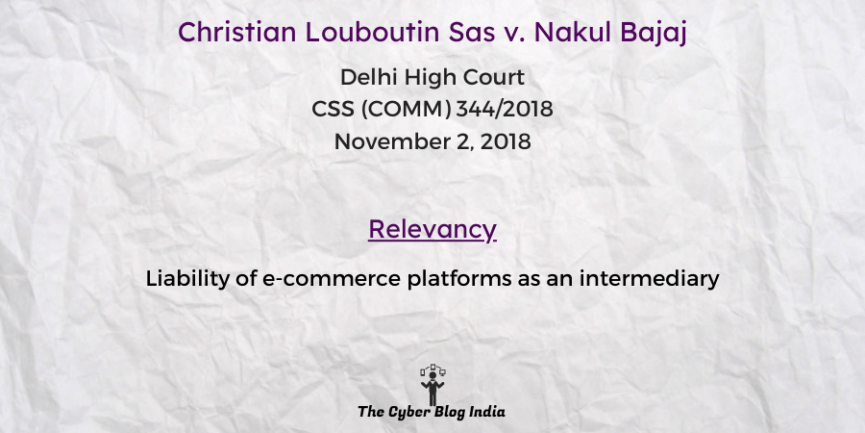Christian Louboutin Sas v. Nakul Bajaj

Christian Louboutin Sas v. Nakul Bajaj
(2018) 253 DLT 728
In the High Court of Delhi
CSS (Comm) 344/2018
Before Justice Prathiba M. Singh
Decided on November 2, 2018
Relevancy of the case: Liability of e-commerce platforms as an intermediary
Statutes & Provisions Involved
- The Information Technology Act, 2000 (Section 66A, 69A, 79, 81, 87)
- The Constitution of India, 1950 (Article 19)
- Indian Copyright Act, 1957 (Section 51)
- The Trademarks Act, 1999 (Section 2, 101, 102)
Relevant Facts of the Case
- The plaintiff is a company manufacturing luxury shoes, Christian Louboutin. According to the plaintiff, its products are only sold through an authorized network of exclusive distributors. Moreover, there are only two stores in India authorized to sell the plaintiff’s products.
- Plaintiff claimed that the defendants, through a website, were selling certain products using the plaintiff’s trademarked brand name. While the defendants claimed that the products were authentic, according to the plaintiff, these products were counterfeits.
- The court had given interim relief to the plaintiffs before, restraining the defendants from selling, offering for sale, advertising, etc any product bearing the registered trademark of the plaintiffs through their e-commerce website.
- The defendant had pleaded section 79 of the IT Act; that it was an intermediary within the meaning of the section and was thus, exempt from liability.
Prominent Arguments by the Advocates
- The plaintiff’s counsel contended that the defendants used various write-ups, displayed the brand font, and so on, to prove the authenticity of the products. These included the use of various trademarked texts and model names that Plaintiff had.
- The defendant’s counsel, in a written statement, submitted that it had no direct dealings with the plaintiff. Furthermore, the counsel claimed that the defendants were merely enabling the booking of orders. They were not selling the products through their online platform.
Opinion of the Bench
- The bench had to peruse through three issues: whether e-commerce platforms were intermediaries?; the legal position of e-commerce websites’; and their liability as intermediaries within Section 79 of the IT Act.
- The bench observed that some e-commerce companies merely source products from the sellers and store them in their godowns and warehouses. In this way, it maintains inventory, thus playing a more active role. Furthermore, if an e-commerce website is conspiring, abetting, aiding or inducing, or contributing to selling counterfeit products, it crosses the line from being an intermediary to an active participant, making it liable for infringement. Hence, they need to operate cautiously if they wish to enjoy the immunity provided to intermediaries.
- In addition, the bench carefully perused Section 79 and Section 81 (the overriding effect of the IT Act, over other provisions). It stated that the IT Act only overrides the Trademark Act of the provisions of the Trademark Act are inconsistent with the IT Act.
- The bench pointed out the plaintiff’s findings that the defendant was using meta-tags. This allowed the defendant to ride on the reputation of the plaintiff as its website would appear if a user types the Plaintiff’s brand name on the search engine. Such a violation of the Trademark Act cannot provide immunity under Section 79.
- Hence, the bench passed orders directing the defendant to disclose the complete details of all its sellers and obtain a certificate proving the genuineness of the products from them. It further directed the defendant to remove all meta-tags and passed orders to display the authenticity of its products and sellers.
Final Decision
- The bench, thus, dismissed the interim application and the suit.
To read this case summary in Hindi, click here. | इस केस सारांश को हिंदी में पढ़ने के लिए यहाँ क्लिक करें।
